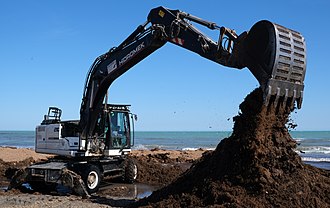Excavator

Excavator is a heavy construction equipment consisting of a boom, dipper (or stick), bucket, and cab on a rotating platform known as the "house." The house sits atop an undercarriage with tracks or wheels. They are a natural progression from the steam shovels and often mistakenly called power shovels. The main function of an excavator is to dig trenches, holes, and foundations. It also has uses in many other applications such as demolition, heavy lifting, grading, landscaping, mining, river dredging, and pile driving.
Design and Function[edit]
The design of an excavator has several key components:
- Boom: The adjustable arm connected to the base of the machine
- Dipper (or Stick): Attaches to the boom and holds the bucket
- Bucket: The tool at the end of the dipper used for digging
- Cab: The area where the operator controls the excavator
- Undercarriage: Consists of tracks or wheels that provide mobility
Excavators are available in various sizes and capacities, from mini-excavators weighing less than a ton to large mining excavators weighing more than 800 tons. The type of excavator used in a project depends on the scale of the work and the environment in which it will operate.
Types of Excavators[edit]
Excavators can be classified based on their mobility and the weight they can carry:
- Crawler Excavators: These are tracked vehicles designed for mining, landscape grading, and heavy construction. They provide better stability and traction in muddy or uneven terrains.
- Wheeled Excavators: More suitable for urban environments, these excavators are faster and can be driven on roads, reducing the need for transportation equipment.
- Mini Excavators: Compact in design, they are used for small to medium-sized projects such as residential work and landscaping.
- Long Reach Excavators: With an extended boom and arm, they are used for demolition and heavy digging in hard-to-reach places.
Applications[edit]
Excavators are versatile machines used in various applications:
- Construction: For digging foundations, trenches, and holes.
- Demolition: Equipped with hydraulic hammers, crushers, or shears, they are used to break down buildings.
- Mining: For material handling, digging, and earth removal.
- Landscaping: For grading, lifting heavy objects, and digging pools.
- River Dredging: Removing sediments and debris from the bottoms of rivers.
Safety and Maintenance[edit]
Safety is a critical aspect of operating an excavator. Operators are required to undergo training and adhere to safety protocols to prevent accidents. Regular maintenance of the excavator is essential to ensure its longevity and efficiency. This includes checking the hydraulic system, engine, undercarriage, and attachments.
Future Trends[edit]
The future of excavators includes the integration of technology such as GPS and IoT for better efficiency, safety, and remote monitoring. Autonomous and electric excavators are also being developed to reduce carbon emissions and operating costs.
This construction related article is a stub. You can help WikiMD by expanding it.
Ad. Transform your life with W8MD's Budget GLP-1 injections from $75


W8MD offers a medical weight loss program to lose weight in Philadelphia. Our physician-supervised medical weight loss provides:
- Weight loss injections in NYC (generic and brand names):
- Zepbound / Mounjaro, Wegovy / Ozempic, Saxenda
- Most insurances accepted or discounted self-pay rates. We will obtain insurance prior authorizations if needed.
- Generic GLP1 weight loss injections from $75 for the starting dose.
- Also offer prescription weight loss medications including Phentermine, Qsymia, Diethylpropion, Contrave etc.
NYC weight loss doctor appointmentsNYC weight loss doctor appointments
Start your NYC weight loss journey today at our NYC medical weight loss and Philadelphia medical weight loss clinics.
- Call 718-946-5500 to lose weight in NYC or for medical weight loss in Philadelphia 215-676-2334.
- Tags:NYC medical weight loss, Philadelphia lose weight Zepbound NYC, Budget GLP1 weight loss injections, Wegovy Philadelphia, Wegovy NYC, Philadelphia medical weight loss, Brookly weight loss and Wegovy NYC
|
WikiMD's Wellness Encyclopedia |
| Let Food Be Thy Medicine Medicine Thy Food - Hippocrates |
Medical Disclaimer: WikiMD is not a substitute for professional medical advice. The information on WikiMD is provided as an information resource only, may be incorrect, outdated or misleading, and is not to be used or relied on for any diagnostic or treatment purposes. Please consult your health care provider before making any healthcare decisions or for guidance about a specific medical condition. WikiMD expressly disclaims responsibility, and shall have no liability, for any damages, loss, injury, or liability whatsoever suffered as a result of your reliance on the information contained in this site. By visiting this site you agree to the foregoing terms and conditions, which may from time to time be changed or supplemented by WikiMD. If you do not agree to the foregoing terms and conditions, you should not enter or use this site. See full disclaimer.
Credits:Most images are courtesy of Wikimedia commons, and templates, categories Wikipedia, licensed under CC BY SA or similar.
Translate this page: - East Asian
中文,
日本,
한국어,
South Asian
हिन्दी,
தமிழ்,
తెలుగు,
Urdu,
ಕನ್ನಡ,
Southeast Asian
Indonesian,
Vietnamese,
Thai,
မြန်မာဘာသာ,
বাংলা
European
español,
Deutsch,
français,
Greek,
português do Brasil,
polski,
română,
русский,
Nederlands,
norsk,
svenska,
suomi,
Italian
Middle Eastern & African
عربى,
Turkish,
Persian,
Hebrew,
Afrikaans,
isiZulu,
Kiswahili,
Other
Bulgarian,
Hungarian,
Czech,
Swedish,
മലയാളം,
मराठी,
ਪੰਜਾਬੀ,
ગુજરાતી,
Portuguese,
Ukrainian